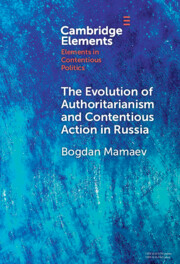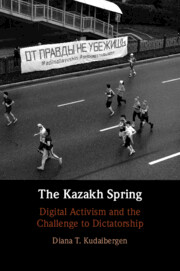256 results
Glitter and Graffiti: Labour, Expertise and the Feminist Remaking of Mexican National Heritage
-
- Journal:
- Journal of Latin American Studies , First View
- Published online by Cambridge University Press:
- 30 May 2024, pp. 1-24
-
- Article
- Export citation

The Evolution of Authoritarianism and Contentious Action in Russia
-
- Published online:
- 30 May 2024
- Print publication:
- 20 June 2024
-
- Element
- Export citation
2 - How Union Organizations Shape Teacher Mobilization
-
- Book:
- Mobilizing Teachers
- Published online:
- 16 May 2024
- Print publication:
- 23 May 2024, pp 13-34
-
- Chapter
- Export citation
7 - Movementism in Argentina
-
- Book:
- Mobilizing Teachers
- Published online:
- 16 May 2024
- Print publication:
- 23 May 2024, pp 131-152
-
- Chapter
- Export citation
Introduction
-
- Book:
- The Kazakh Spring
- Published online:
- 16 May 2024
- Print publication:
- 23 May 2024, pp 1-34
-
- Chapter
- Export citation
10 - Teacher Politics in Comparative Perspective
-
- Book:
- Mobilizing Teachers
- Published online:
- 16 May 2024
- Print publication:
- 23 May 2024, pp 192-218
-
- Chapter
- Export citation
8 - Making Sense of the Bloody January 2022 Mass Protests
-
-
- Book:
- The Kazakh Spring
- Published online:
- 16 May 2024
- Print publication:
- 23 May 2024, pp 244-274
-
- Chapter
- Export citation
1 - Why Teachers?
-
- Book:
- Mobilizing Teachers
- Published online:
- 16 May 2024
- Print publication:
- 23 May 2024, pp 1-12
-
- Chapter
- Export citation

The Kazakh Spring
- Digital Activism and the Challenge to Dictatorship
-
- Published online:
- 16 May 2024
- Print publication:
- 23 May 2024
Between Land Reform and Postcolonial Frustration: Understanding the Social Roots of Local Opposition to the PAIGC/PAICV in Santo Antão, Cabo Verde, 1975–91
-
- Journal:
- The Journal of African History , First View
- Published online by Cambridge University Press:
- 24 April 2024, pp. 1-17
-
- Article
-
- You have access
- Open access
- HTML
- Export citation
Happy Holidays? Evidence from Chinese Stock Exchanges
-
- Journal:
- Business and Politics , First View
- Published online by Cambridge University Press:
- 22 April 2024, pp. 1-12
-
- Article
-
- You have access
- HTML
- Export citation
Protesting exile: Cretan refugee activists in the late Ottoman Empire
-
- Journal:
- New Perspectives on Turkey / Volume 70 / May 2024
- Published online by Cambridge University Press:
- 12 April 2024, pp. 32-51
- Print publication:
- May 2024
-
- Article
- Export citation
#Resistencia: Indigenous Movements, Social Media, and Mobilization in Latin America
-
- Journal:
- Latin American Research Review ,
- Published online by Cambridge University Press:
- 19 March 2024, pp. 1-20
-
- Article
-
- You have access
- Open access
- HTML
- Export citation
“Yugoslavia is worthless . . . you can get neither sugar nor kerosene.” Food Supply and Political Legitimacy in the Slovene Part of Yugoslavia, 1918–1924
-
- Journal:
- Austrian History Yearbook , First View
- Published online by Cambridge University Press:
- 08 March 2024, pp. 1-12
-
- Article
-
- You have access
- Open access
- HTML
- Export citation
The Constitutive Power of Public Debate
-
- Journal:
- Canadian Journal of Political Science/Revue canadienne de science politique / Volume 57 / Issue 1 / March 2024
- Published online by Cambridge University Press:
- 05 March 2024, pp. 156-173
-
- Article
-
- You have access
- Open access
- HTML
- Export citation
Pandemics and Paradigms of Contestation
-
- Journal:
- Canadian Journal of Law & Society / La Revue Canadienne Droit et Société / Volume 38 / Issue 3 / December 2023
- Published online by Cambridge University Press:
- 21 February 2024, pp. 299-315
-
- Article
-
- You have access
- Open access
- HTML
- Export citation
By Any Means Necessary? How Black and White Americans Evaluate Protest Tactics in Response to a Police Killing
-
- Journal:
- Journal of Race, Ethnicity and Politics , First View
- Published online by Cambridge University Press:
- 16 February 2024, pp. 1-24
-
- Article
-
- You have access
- Open access
- HTML
- Export citation
Faith and the Absurd: Kierkegaard, Camus and Job’s Religious Protest
-
- Journal:
- Harvard Theological Review / Volume 117 / Issue 2 / April 2024
- Published online by Cambridge University Press:
- 12 February 2024, pp. 293-316
- Print publication:
- April 2024
-
- Article
-
- You have access
- Open access
- HTML
- Export citation
Radical Autochthony? Proprietary Political Discourse Among Elites and Peasants in the Anti-Balaka Armed Movement in the Central African Republic
-
- Journal:
- African Studies Review , First View
- Published online by Cambridge University Press:
- 22 December 2023, pp. 1-19
-
- Article
-
- You have access
- Open access
- HTML
- Export citation



